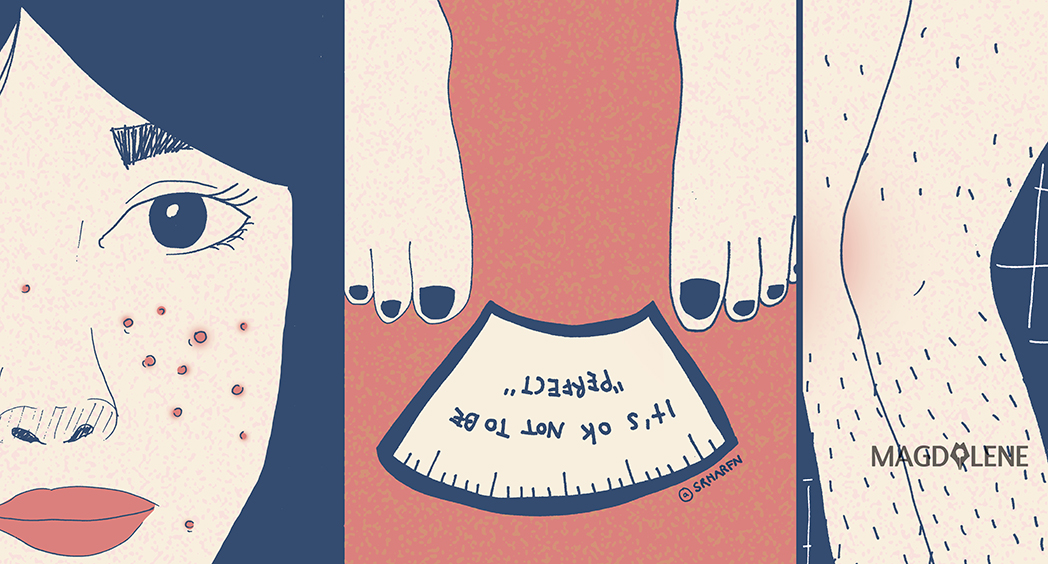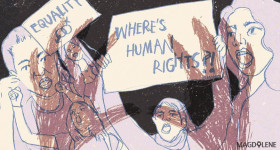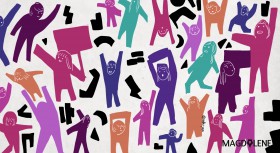I was enjoying a restful weekend when I watched the social media set ablaze by an influencer who insisted that plus size models don't deserve to be on the same stage or spotlight as Victoria Secret’s Angels, who, according to her, are the epitome of beauty.
This person, a self-proclaimed “Minister of Beauty” on Instagram, also posted a full-bodied picture of the non-gender-conforming Jordan Alexander, who stars in Gossip Girl’s Reboot, and called her “Burik”, an Indonesian slang for ugly. Some of her followers called her off for body-shaming, and she defended herself by saying that the comment was meant for the show.
Regardless of her non-stop defense and justifications, a lot of people have been outraged by the post. About a dozen public figures on social media responded with body-positive messages and emphasized the importance of diversity and inclusion. Some of my friends even posted photos of themselves as a way to claim their own definition of beauty and protest against the self-proclaimed “Minister of Beauty”.
Still, there are also those who sided with her and insisted that there can only be one standard of beauty – the one epitomized by VS Angels. To them, everything else is just an apology for those who are too “lazy” to stay healthy and fit.
Alaso read: Why Words Matter
The truth is I can’t help but to feel sorry for those who refuse to welcome inclusivity as a new way to celebrate beauty. Here are the reasons:
-
It is ignorant to assume those who have different beauty standards as “lazy”
The “Minister of Beauty” and her posse of women seem to have missed the fact that a fit, healthy body doesn’t necessarily look the same. According to the National Eating Disorders Association (NEDA) in the U.S., “People have different genetics and metabolism that even if everyone started eating the same things and did the same amount of exercise for a whole year, they would not all look the same at the end of the year. This is because each person’s genetic inheritance influences their bone structure, body size, shape, and weight differently.”
By assuming those who don't try to look like VS models are “lazy people who don't try to be fit,” they are denying the biological facts that people have different genes and metabolism.
-
Women actually DIED from eating disorders
For years now, the fashion industry has been criticized for glorifying models with unhealthy diets and lifestyles. Former editor of Australian Vogue, Kirstie Clements testified that since the early 2000s, models have continued to become skinnier to the point that they had to starve themselves and think that fainting from starving and going to hospital is normal. She recalled that on a beauty shoot, she once asked her model why her knees have lots of scars, the model’s answer was: "Oh yes. Because I'm always so hungry, I faint a lot."
Now, imagine being a teenager and constantly seeing 0 size models broadcasted on TV. In contrast to inspiring a healthy and fit lifestyle, it actually advocates for a standard of beauty that could lead you to an unhealthy diet and mental illness. According to the National Association of Anorexia Nervosa and Associated Disorders, eating disorders are among the deadliest mental illnesses, second only to opioid addiction, resulting in approximately 10,200 deaths each year in the United States alone.
Also read: 'Everyone Is Beautiful': A Necessary Campaign
-
Shaming and downgrading other women is internalized sexism
The “Minister of Beauty” hinted that when she was little, she used to have her parents comment about her physique, which prompted her to get plastic surgery. Though she claimed that this comment never affected her psychologically, this, to me, sounded like a very familiar childhood trauma endured by many little girls.
Let’s think about when we were little, between “You’re so smart and kind!” and “You look so pretty!”, which one is more common? If your answer is the first one, then I guess, congratulations, you’re one of the lucky ones. But if your answer is the latter, then like most young girls, we have been taught by society that beauty is the most valuable currency, that beauty gets attention, even more than other more important traits like intelligence and kindness.
This mindset of looking at physical appeal as a currency force little girls to objectify themselves and based their worth on beauty as a currency is called internalized sexism.
Communications Expert Preston Ni shared that those with internalized sexism are often unaware of their actions and words that disempower other women. Many who grew up around gender stereotypes ended up believing that women have to be a certain way to be worthy. In turn, these women make other girls and women feel they are less if they don’t adhere to these rules.
To those with internalized sexism, it is easier to judge things from a “patriarchal perspective”. The alternative standards and reality other than the one that had been imposed on them since childhood could feel scary, so it’s easier to justify the existing norms, practices and beliefs – however toxic – as the “right” ones.
While acknowledging and freeing oneself from internalized sexism is no walk in the park, I believe that practicing compassion and kindness to ourselves and others before making any remarks can really go a long way, even more so in today’s digital spaces.







Comments